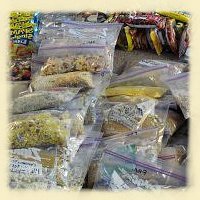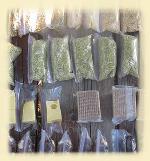
Food for Treks
Daily Food
 Pretty much any snacks work to provide energy for a Day Hike since you can eat a healthy breakfast before hiking and a nice dinner when you get home.
Pretty much any snacks work to provide energy for a Day Hike since you can eat a healthy breakfast before hiking and a nice dinner when you get home.Once your hike becomes multi-day, your nutrition needs change greatly. You now need to ensure your body is receiving more than just calories.
A good distribution of foods from the food pyramid, possibly supplemented by a daily vitamin will keep you hiking strong for days, weeks, and even months on end.
The calories you consume should be around 15% proteins, 50%-65% carbohydrates, and 20%-35% fats.
Carbohydrates provide faster energy, fat more long-burning, and protein replenishes and keeps muscles healthy over time. Reducing protein too much will be devastating on a long-distance hike.
Carbohydrates and proteins have 4 cal/gram (113 cal/oz), while fats have 9 cal/gram (255 cal/oz). It is a good goal to find calorie-dense foods so fewer pounds are carried for the same amount of energy. A food pack containing about 4.25 cal/g (120 cal/oz) is fairly dense. Most multi-day hikers carry 1.5 to 2.0 pounds of food per day. That means carrying more than about ten days of food becomes impossibly heavy. For longer treks, read about supplying food along the way.
The process to outfit your trekking food is:
- Estimate how many calories are needed with this Calorie Calculator.
- Create the meals with this Menu Planner.
- Shop for food. Start early and buy when items are on sale since they can be stored.
- Repackage. Just before the trek, repackage food into meals so all ingredients are easy to find.
- List required utensils. Choose food to minimize the extra tools needed.
The planning of food, shopping for ingredients, and repackaging into meals is an enjoyable part of planning for a long hike. It's exciting to think I will be preparing this meal while the sun is setting on some far mountain.
Figuring out what tastes might work together, making sure I have enough but not too much food, understanding what utensils are needed to make the meal - all parts of the planning that can be a lot of fun.
Some people like real food, such as steak, stew, hamburgers, or other items that take real cooking and weigh a ton. These people tend to take day hikes from a base camp, exploring an area thoroughly.
To take an extended trek requires changing your expectations of food and the effort involved in carrying it and preparing it. Minimizing the weight to carry and the time, fuel, and utensils needed to prepare a meal are the main goals.
Reduce the Weight
 It makes no sense to carry any more weight than necessary. Since a large portion of total pack weight can be food, that is a good place to start lightening the load.
It makes no sense to carry any more weight than necessary. Since a large portion of total pack weight can be food, that is a good place to start lightening the load.There are a number of ways to reduce the weight of your hiking food:
- Dehydrate - buy your own food dehydrator and dry fruits, vegetables, and meats. Most inexpensive and healthy option but requires effort at home. A dried apple is still an apple, just without the water.
- Buy Prepackaged - purchasing freeze-dried or dehydrated meals is the easiest. It is also the most expensive and can introduce large amounts of sodium and preservatives.
- Calorie Density - read the nutrition labels on foods. Find those that are dense in calories compared to weight. Sunflower kernels are 190 cal/oz while an apple is 15 cal/oz. and a dehydrated apple is 100 cal/oz.
- Repackage food - you'll be surprised how much garbage labelling you'll throw away. Better to just leave it at home rather than carry it mile after mile just to throw away later.
Other Trek Food Tips
- Take dehydrated fruits and vegetables to help input vitamins not found in processed foods.
- Take a daily vitamin each day to help fill any lack of nutrition in your food choices.
- Pack spices. Take a lightweight container of 5 or 6 common spices to add flavor to meals - salt, cayenne pepper, garlic, cinnamon, chili powder, onion, or whatever you like.
- If you expect cold mornings, or aren't eager to start hiking bright and early, have oatmeal and hot chocolate. On long treks, I prefer packing up and moving right away with a break for Pop-tart, granola bar, or trail mix after an hour or so. This saves a lot of time heating water and clean up. It also means less fuel to carry.
- The ultimate lightweight meal packaging is to just take your credit card. When thru-hiking a long trail that goes through towns, it's a lot lighter to eat at a restaurant or buy fresh food at a grocery store than to carry your meals.
- Andrew Skurka says Balance Bars are great. He ate 1,100 of them hiking across America.
- Brian Robinson says Snickers Bars are inexpensive, tasty, and packed with 280 cal in 59g.
All Comments:
Sep 07, 2012 - Grant Volrathy
Mar 22, 2014 - Don Stock
Apr 05, 2014 - Christian smith
Jul 06, 2014 - reinhardt
Jul 20, 2014 - Hiking Dude
Nov 03, 2014 - Kristian pilgård
Nov 06, 2014 - Hiking Dude
Mar 23, 2015 - Jim
Mar 23, 2015 - Hiking Dude
Mar 26, 2015 - Julia Hubbel
Mar 31, 2015 - Hiking Dude
May 11, 2015 - Pat Corn
Jun 07, 2015 - jim
Jun 08, 2015 - Hiking Dude
Sep 29, 2015 - marcus
thanks
Sep 30, 2015 - Hiking Dude
I doubt you will be able to carry food for 20 days in your pack - that would be at least 30 pounds of food. A resupply part way through your trek is probably needed.
Jan 27, 2016 - StickeeRich
Jan 30, 2016 - Hiking Dude
Feb 16, 2016 - Jac
Thanks a lot!!
Feb 17, 2016 - Hiking Dude
The MREs that I've seen are a huge amount of extra weight for the amount of nutrition. I think you'd be better off with backpacking meals or dehydrated food.
On CT FAQ it says snowpack lasts into July so your attempt in May might be too early in the season.
Mar 31, 2016 - Rick
Any suggestions for daily food supplies?
Apr 01, 2016 - Hiking Dude
If not, I would bring peanut butter, ritz-like crackers, pringles, dried fruit, pouches of tuna and chicken, powdered gatorade, and whatever else sounds good, is calorie dense, and won't spoil.
Apr 01, 2016 - Debbie Staley
Thanks
Apr 01, 2016 - Hiking Dude
Read this page for training.
Read this page for calorie calculator.
Jun 02, 2016 - Ceri Ward
Aug 22, 2016 - Keith Wilkinson
Oct 07, 2016 - Mistie
Jan 16, 2017 - Cody
Jan 16, 2017 - Hiking Dude
Sep 18, 2017 - Pete
cheers
Sep 18, 2017 - Hiking Dude
Feb 04, 2020 - Brian
Ask a Question
Find more Hiking Resources at www.HikingDude.com


 Resupply Options
Resupply Options Cooking Options
Cooking Options
Follow Me
Recent Comments